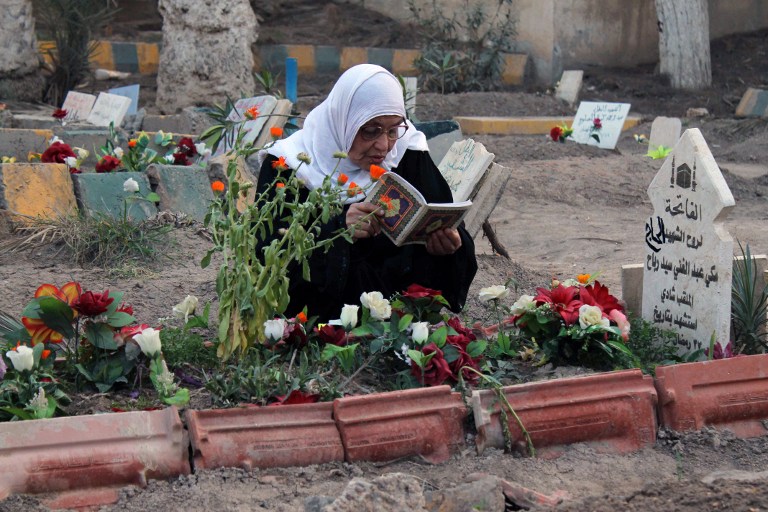SUMMARY
This is AI generated summarization, which may have errors. For context, always refer to the full article.

DEIR EZZOR, Syria – Mohammed Assad holds the Muslim holy book the Koran as he stands over the grave of his eldest son, buried beside a see-saw in a public park in Syria’s eastern city of Deir Ezzor.
“God will punish Bashar (al-Assad, the president) and his people for turning our public parks into cemeteries,” he says.
Men, women and children, and sometimes fighters barely out of adolescence — every day Al-Mashtal park in the city becomes the final resting place for new victims of the conflict that has torn Syria apart for over two years.
Umm Mohammed is also there, mourning for her 11-year-old son who was killed in a bombardment.
“I come here every day and stay from sunrise until four o’clock to be with my baby boy. It’s a way to be by his side. I’m here for him, I read him verses from the Koran and talk to him,” she says.
Mohammed was killed when artillery shells struck outside his home as he played with one of his best friends. The other boy was also killed.
“He was my joy, my inspiration to smile every day in the middle of this war. And now he is dead,” the distraught mother cries, clawing at her own face.
Gravedigger Abdelrazzak speaks up bluntly.
“For the past nine months, the only thing the Syrian government has given us is bombs and more bombs,” he says.
“My kids can’t go out because it’s too dangerous. They’ve been stuck in the house for nine months because I’ve had to bury so many children with my own hands, and I don’t want to have to do the same with my own.
“I never would have thought this park where my children played would become a graveyard,” he adds, gesturing at the mounds of earth, some topped with plastic flowers.
Abdelrazzak says that more than 3,000 people have been killed in Deir Ezzor since the country’s former oil hub was drawn into the conflict in June 2012.
A former oil worker himself, he says that the municipal cemetery quickly filled, so public parks were requisitioned as burial plots.
Al-Mashtal alone is the burial site for 160 “martyrs,” some of whom still remain unidentified. And some graves contain only a limb, all that was left of a person blown apart by the explosions.
Abdelrazzak has a notebook in which he has recorded the location of every grave and what is known about its occupant.
“Because of this, I will know where each body goes, just in case a shell or rocket blast destroys the graves. We can’t allow families to pray over the burial places of people who are not their own.”
On the other side of the park, a woman kneels on the ground and touches the freshly turned earth.
“Why, Saad, why did you have to go?”
Her brother Saad Haj Shehab was killed on February 16 while battling regime forces. He was just 17.
“My brother died fighting a dictator. We are proud of him,” says one of the dead teenager’s brothers, Ahmed Taj Haj Shehab who is himself a fighter with the rebel Free Syrian Army along with three more brothers.
A group of fighters arrives, the young men walking between the rows of graves until they find the one they are looking for. One of their number breaks down in tears.
“It’s my dad. He was killed by regime shelling. I was at the front when he was buried, and wasn’t able to say goodbye,” he sobs. “Father, please forgive me…”
Abdelrazzak sighs.
“Every day I see things like this — young people crying over their parents, mothers and fathers crying for their children.
“So much bloodshed. Is it worth it? Honestly, I ask myself that question every day when the bodies arrive for me to bury in this cemetery. I still don’t have an answer.” – Rappler.com
Add a comment
How does this make you feel?
There are no comments yet. Add your comment to start the conversation.